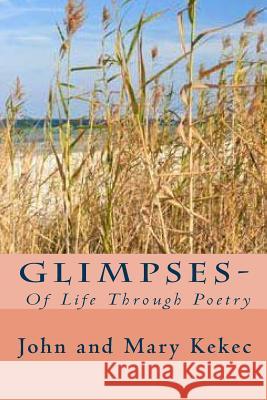Glimpses-: Of Life Through Poetry » książka
Glimpses-: Of Life Through Poetry
ISBN-13: 9781514796672 / Angielski / Miękka / 2015 / 140 str.
It's said that poetry lifts the veil from the hidden beauty of the world and that it is wisdom mingled with delightful pleasure. Poetry has been likened to a nightingale, who sits in solitude and sings to favor us with cheerful reflections; his auditors softened and entranced by the melody of this unseen musician. Much has been written about the importance and purpose of poetry. Poetry strengthens the moral nature of man in the same manner as exercise strengthens a limb. It awakens and enlarges the mind. Poetry evokes emotional responses and often acts in a dimension beyond our consciousness. It is able to exhibit the beauty of conceptions in all their naked truth and splendor. Poetry is powerful, and although it sometimes may be light and formative, it may also be insightful and reflect a maturity of greater significance. It expresses feelings and raises emotions to the degree that one's experiences allow them to identify and be connected. It has been said that poetry gets to the heart of the matter, and is efficient in that it says the most in the fewest number of well-chosen words. Poetry is intended to stimulate our latent inner thoughts and emotions. Our spirits are often heightened by such things as a cold plunge in a cold stream, or after some kind of moving performance or personal experience; or even while just enjoying one of nature's tranquil scenes or some other form of inebriating or exhilarating experience. This is probably fitting, since that is perhaps the way that poetry is often initially conceived and written. Writing in the early 19th century Shelley wrote in his Defense of Poetry that poetry expresses images of life's eternal truths. He said that textbooks traditionally present new facts that no one ever knew before, but that poetry is just the opposite in that it expresses things that are known already by everyone. The only caveat was that people can only realize and truly understand these truths, which are already in them, if they are able to openly be in resonance with them. He said that poems, in a collective sense, are vignettes that contain the individual sums of various human experiences, from every angle and perspective. Some poems help us explore the depths of a specific emotion or the beauty of nature; others help us grasp the fullness of mature thoughts, on some given subject, or help us experience life from within another framework. But all poems help us to become more human. An epitome or abstract gives a brief summary or representative type. In like manner poetry epitomizes something that is worthwhile that is buried in some story or large body of text, and is then a mirror that reflects these particular eternal truths to us. President John F. Kennedy wrote, "When power leads man toward arrogance, poetry reminds him of his limitations. When power narrows the areas of man's concern, poetry reminds him of the richness and diversity of his existence. When power corrupts, poetry cleanses, for art establishes the basic human truths which must serve as the touchstones of our sensibility and judgment, and the last champion of the individual mind against an intrusive society."
Zawartość książki może nie spełniać oczekiwań – reklamacje nie obejmują treści, która mogła nie być redakcyjnie ani merytorycznie opracowana.











